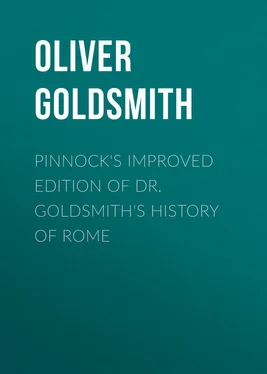Oliver Goldsmith - Pinnock's improved edition of Dr. Goldsmith's History of Rome
Здесь есть возможность читать онлайн «Oliver Goldsmith - Pinnock's improved edition of Dr. Goldsmith's History of Rome» — ознакомительный отрывок электронной книги совершенно бесплатно, а после прочтения отрывка купить полную версию. В некоторых случаях можно слушать аудио, скачать через торрент в формате fb2 и присутствует краткое содержание. Издательство: Иностранный паблик, Жанр: foreign_antique, foreign_prose, на английском языке. Описание произведения, (предисловие) а так же отзывы посетителей доступны на портале библиотеки ЛибКат.
- Название:Pinnock's improved edition of Dr. Goldsmith's History of Rome
- Автор:
- Издательство:Иностранный паблик
- Жанр:
- Год:неизвестен
- ISBN:нет данных
- Рейтинг книги:4 / 5. Голосов: 1
-
Избранное:Добавить в избранное
- Отзывы:
-
Ваша оценка:
- 80
- 1
- 2
- 3
- 4
- 5
Pinnock's improved edition of Dr. Goldsmith's History of Rome: краткое содержание, описание и аннотация
Предлагаем к чтению аннотацию, описание, краткое содержание или предисловие (зависит от того, что написал сам автор книги «Pinnock's improved edition of Dr. Goldsmith's History of Rome»). Если вы не нашли необходимую информацию о книге — напишите в комментариях, мы постараемся отыскать её.
Pinnock's improved edition of Dr. Goldsmith's History of Rome — читать онлайн ознакомительный отрывок
Ниже представлен текст книги, разбитый по страницам. Система сохранения места последней прочитанной страницы, позволяет с удобством читать онлайн бесплатно книгу «Pinnock's improved edition of Dr. Goldsmith's History of Rome», без необходимости каждый раз заново искать на чём Вы остановились. Поставьте закладку, и сможете в любой момент перейти на страницу, на которой закончили чтение.
Интервал:
Закладка:
5. Besides the members of the gens, there were attached to it a number of dependents called clients, who owed submission to the chief as their patron, and received from him assistance and protection. The clients were generally foreigners who came to settle at Rome, and not possessing municipal rights, were forced to appear in the courts of law, &c. by proxy. In process of time this relation assumed a feudal form, and the clients were bound to the same duties as vassals 29 29 See Historical Miscellany Part III. Chap. i. They were called "patres nunorum gentium," the senators of the inferior gentes. The "comitia curiata," assembled in the comi'tium, the general assemblies of the people were held in the forum. The patrician curiæ were called, emphatically, the council of the people; (concilium populi;) the third estate was called plebeian, (plebs.) This distinction between populus and plebs was disregarded after the plebeians had established their claim to equal rights. The English reader will easily understand the difference, if he considers that the patricians were precisely similar to the members of a close corporation, and the plebeians to the other inhabitants of a city. In London, for example, the common council may represent the senate, the livery answer for the populus, patricians, or comitia curiata, and the general body of other inhabitants will correspond with the plebs. There were certain sacrifices which the Romans believed could only be offered by a king; after the abolition of royalty, a priest, named the petty sacrificing king, (rex sacrificulus,) was elected to perform this duty. Perhaps it would be more accurate to say the exclusive right of legislation; for it appears that the comitia centuriata were sometimes summoned to give their sanction to laws which had been previously enacted by the curiæ. See Chap. XII. The Romans were previously acquainted with that great principle of justice, the right of trial by a person's peers. In the earliest ages the patricians had a right of appeal to the curiæ; the Valerian laws extended the same right to the plebeians. The senators were called conscript fathers, (patres conscripti,) either from their being enrolled on the censor's list, or more probably from the addition made to their numbers after the expulsion of the kings, in order to supply the places of those who had been murdered by Tarquin. The new senators were at first called conscript, and in the process of time the name was extended to the entire body.
in the middle ages.
6. The chiefs of the gentes composed the senate, and were called "fathers," (patres.) In the time of Romulus, the senate at first consisted only of one hundred members, who of course represented the Latin tribe Ramne'nses; the number was doubled after the union with the Sabines, and the new members were chosen from the Titienses. The Tuscan tribe of the Lu'ceres remained unrepresented in the senate until the reign of the first Tarquin, when the legislative body received another hundred 30 30 They were called "patres nunorum gentium," the senators of the inferior gentes. The "comitia curiata," assembled in the comi'tium, the general assemblies of the people were held in the forum. The patrician curiæ were called, emphatically, the council of the people; (concilium populi;) the third estate was called plebeian, (plebs.) This distinction between populus and plebs was disregarded after the plebeians had established their claim to equal rights. The English reader will easily understand the difference, if he considers that the patricians were precisely similar to the members of a close corporation, and the plebeians to the other inhabitants of a city. In London, for example, the common council may represent the senate, the livery answer for the populus, patricians, or comitia curiata, and the general body of other inhabitants will correspond with the plebs. There were certain sacrifices which the Romans believed could only be offered by a king; after the abolition of royalty, a priest, named the petty sacrificing king, (rex sacrificulus,) was elected to perform this duty. Perhaps it would be more accurate to say the exclusive right of legislation; for it appears that the comitia centuriata were sometimes summoned to give their sanction to laws which had been previously enacted by the curiæ. See Chap. XII. The Romans were previously acquainted with that great principle of justice, the right of trial by a person's peers. In the earliest ages the patricians had a right of appeal to the curiæ; the Valerian laws extended the same right to the plebeians. The senators were called conscript fathers, (patres conscripti,) either from their being enrolled on the censor's list, or more probably from the addition made to their numbers after the expulsion of the kings, in order to supply the places of those who had been murdered by Tarquin. The new senators were at first called conscript, and in the process of time the name was extended to the entire body.
from that tribe. Tarquin the elder was, according to history, a Tuscan Iticumo, and seems to have owed his elevation principally to the efforts of his compatriots settled at Rome. It is to this event we must refer, in a great degree, the number of Tuscan ceremonies which are to be found in the political institutions of the Romans.
7. The gentes were not only represented in the senate, but met also in a public assembly called "comitia curiata." In these comitia the kings were elected and invested with royal authority. After the complete change of the constitution in later ages, the "comitia curiata" 31 31 The "comitia curiata," assembled in the comi'tium, the general assemblies of the people were held in the forum. The patrician curiæ were called, emphatically, the council of the people; (concilium populi;) the third estate was called plebeian, (plebs.) This distinction between populus and plebs was disregarded after the plebeians had established their claim to equal rights. The English reader will easily understand the difference, if he considers that the patricians were precisely similar to the members of a close corporation, and the plebeians to the other inhabitants of a city. In London, for example, the common council may represent the senate, the livery answer for the populus, patricians, or comitia curiata, and the general body of other inhabitants will correspond with the plebs. There were certain sacrifices which the Romans believed could only be offered by a king; after the abolition of royalty, a priest, named the petty sacrificing king, (rex sacrificulus,) was elected to perform this duty. Perhaps it would be more accurate to say the exclusive right of legislation; for it appears that the comitia centuriata were sometimes summoned to give their sanction to laws which had been previously enacted by the curiæ. See Chap. XII. The Romans were previously acquainted with that great principle of justice, the right of trial by a person's peers. In the earliest ages the patricians had a right of appeal to the curiæ; the Valerian laws extended the same right to the plebeians. The senators were called conscript fathers, (patres conscripti,) either from their being enrolled on the censor's list, or more probably from the addition made to their numbers after the expulsion of the kings, in order to supply the places of those who had been murdered by Tarquin. The new senators were at first called conscript, and in the process of time the name was extended to the entire body.
rarely assembled, and their power was limited to religious matters; but during the earlier period of the republic, they claimed and frequently exercised the supreme powers of the state, and were named emphatically, The People.
8. The power and prerogatives of the kings at Rome, were similar to those of the Grecian sovereigns in the heroic ages. The monarch was general of the army, a high priest, 32 32 There were certain sacrifices which the Romans believed could only be offered by a king; after the abolition of royalty, a priest, named the petty sacrificing king, (rex sacrificulus,) was elected to perform this duty. Perhaps it would be more accurate to say the exclusive right of legislation; for it appears that the comitia centuriata were sometimes summoned to give their sanction to laws which had been previously enacted by the curiæ. See Chap. XII. The Romans were previously acquainted with that great principle of justice, the right of trial by a person's peers. In the earliest ages the patricians had a right of appeal to the curiæ; the Valerian laws extended the same right to the plebeians. The senators were called conscript fathers, (patres conscripti,) either from their being enrolled on the censor's list, or more probably from the addition made to their numbers after the expulsion of the kings, in order to supply the places of those who had been murdered by Tarquin. The new senators were at first called conscript, and in the process of time the name was extended to the entire body.
and first magistrate of the realm; he administered justice in person every ninth day, but an appeal lay from his sentence, in criminal cases, to the general assemblies of the people. The pontiffs and augurs, however, were in some measure independent of the sovereign, and assumed the uncontrolled direction of the religion of the state.
Интервал:
Закладка:
Похожие книги на «Pinnock's improved edition of Dr. Goldsmith's History of Rome»
Представляем Вашему вниманию похожие книги на «Pinnock's improved edition of Dr. Goldsmith's History of Rome» списком для выбора. Мы отобрали схожую по названию и смыслу литературу в надежде предоставить читателям больше вариантов отыскать новые, интересные, ещё непрочитанные произведения.
Обсуждение, отзывы о книге «Pinnock's improved edition of Dr. Goldsmith's History of Rome» и просто собственные мнения читателей. Оставьте ваши комментарии, напишите, что Вы думаете о произведении, его смысле или главных героях. Укажите что конкретно понравилось, а что нет, и почему Вы так считаете.











